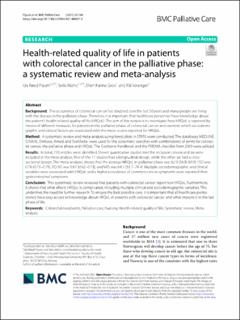| dc.description.abstract | Background The occurrence of colorectal cancer has doubled over the last 50 years and many people are living with the disease in the palliative phase. Therefore, it is important that healthcare personnel have knowledge about the patient’s health-related quality of life (HRQoL). The aim of this review is to investigate how HRQoL is reported by means of different measures for patients in the palliative phase of colorectal cancer and examine which sociodemographic and clinical factors are associated with the mean scores reported for HRQoL. Method A systematic review and meta-analysis using forest plots in STATA were conducted. The databases MEDLINE, CINAHL, Embase, Amed, and SveMed+ were used for the systematic searches with combinations of terms for colorectal cancer, the palliative phase and HRQoL. The Cochrane handbook and the PRISMA checklist from 2009 were utilised. Results In total, 710 articles were identified. Eleven quantitative studies met the inclusion criteria and six were included in the meta-analysis. Five of the 11 studies had a longitudinal design, while the other six had a cross-sectional design. The meta-analyzes shows that the average HRQoL in palliative phase was 62.9 (56.8–69.0) 15D was 0.76 (0.73–0.79), EQ-5D was 0.67 (0.62–0.73), and VAS was 64.1 (53.7–74.4). Multiple sociodemographic and clinical variables were associated with HRQoL and a higher prevalence of common cancer symptoms were reported than gastrointestinal symptoms. Conclusion This systematic review revealed that patients with colorectal cancer report low HRQoL. Furthermore, it shows that what affects HRQoL is complicated, including multiple clinical and sociodemographic variables. This underlines the need for further research. To ensure the best possible care, it is important that all healthcare professionals have easy access to knowledge about HRQoL in patients with colorectal cancer, and what impacts it in the last phase of life. | en_US |

